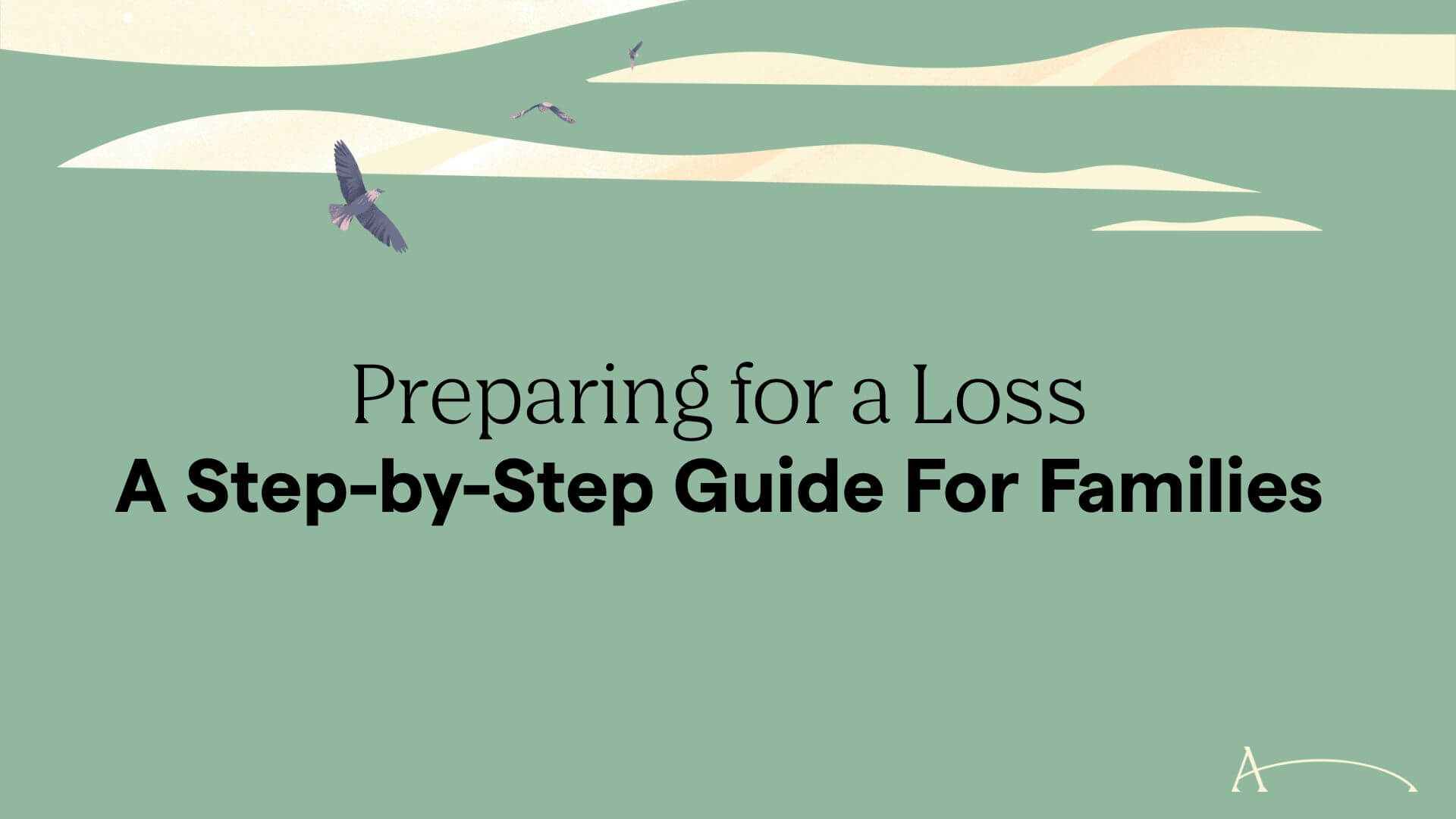
It pays to plan ahead
Preplan your own funeral arrangement online in minutes
Arrange Immediate
Cremation Services
Cremation Services
Speak to our dedicated care specialists now
Losing a loved one is an incredibly difficult and emotional experience that we will all face at some point in our lives. Whether it's a spouse, parent, sibling, or close friend, the pain of their absence can be overwhelming. While we can never truly be fully prepared for the loss of a loved one, there are steps we can take to help navigate the grieving process and make the necessary arrangements. In this blog post, we will explore how to prepare for the loss of a loved one, both emotionally and practically. From understanding the stages of grief to organizing financial and legal paperwork, we will provide guidance on how to approach this challenging time with grace and compassion. Additionally, we will discuss the importance of self-care during bereavement and how to move forward in life after loss. By facing the inevitable head-on and taking proactive steps, we can alleviate some of the burdens that accompany the loss of a loved one and focus on healing and honoring their memory.
Understanding Grief and Loss
Losing a loved one is a deeply personal and emotional experience, and understanding the process of grief and loss can help us navigate through this difficult time. In this section, we will explore the stages of grief, common emotions experienced during grief, and how grief can affect our overall health.
The stages of grief
Grief is not a linear process, but rather a series of stages that individuals may go through in their own unique way. While these stages are not experienced in a specific order or timeframe, they provide a framework for understanding the emotional journey of grief.
- Denial: Initially, it is common for individuals to feel a sense of denial or disbelief about the loss. This may include feelings of shock or numbness as the reality of the situation sinks in.
- Anger: As the initial shock fades, feelings of anger and frustration may arise. It is natural to question why this loss has occurred and to direct anger towards oneself, others, or even the departed loved one.
- Bargaining: During this stage, individuals may find themselves making deals or bargaining with a higher power in an attempt to reverse the loss. It is a way of seeking control or trying to find a solution to the pain.
- Depression: The stage of depression is characterized by a profound sadness and a sense of emptiness. It is common to experience feelings of loneliness, withdrawal, and a lack of interest in previously enjoyed activities.
- Acceptance: Acceptance does not mean forgetting or moving on, but rather acknowledging the reality of the loss and finding ways to live with it. This stage signifies a turning point where individuals begin to adjust to life without their loved one.
Common emotions experienced during grief
Grief is an intensely emotional experience, and it is important to recognize and validate the range of emotions that may arise during this time. Some common emotions include:
- Sadness: A deep and profound feeling of loss and sorrow.
- Guilt: Feelings of guilt may arise, questioning if more could have been done or if there were unresolved issues with the loved one.
- Regret: The sense of missed opportunities or unfulfilled wishes may lead to feelings of regret.
- Anguish: Intense emotional pain, often accompanied by physical sensations such as tightness in the chest or difficulty breathing.
- Confusion: Grief can bring about a sense of confusion, as individuals may struggle to make sense of the loss and the new reality they find themselves in.
- Relief: In cases of prolonged illness or suffering, it is not uncommon to feel a sense of relief that the loved one is no longer in pain.
How grief can affect health
Grief can have a significant impact on both our mental and physical health. It is essential to be aware of these effects and take steps to prioritize self-care during this challenging time.
- Mental health: Grief can lead to symptoms of depression, anxiety, and difficulty concentrating. It is important to seek support from loved ones or professionals if these symptoms persist or worsen.
- Physical health: The stress of grief can manifest in physical symptoms such as fatigue, changes in appetite, sleep disturbances, and weakened immune system. Taking care of our physical well-being through proper nutrition, exercise, and rest is crucial.
- Social and interpersonal relationships: Grief may impact our relationships with others, as we may feel isolated, withdrawn, or have difficulty connecting with those around us. Understanding these dynamics can help us navigate our interactions and seek support when needed.
By understanding the stages of grief, acknowledging the wide range of emotions, and recognizing the impact on our health, we can better prepare ourselves to navigate the grieving process with compassion and self-care.
Emotional Preparation
Emotional preparation plays a crucial role in how we navigate the loss of a loved one. In this section, we will discuss important aspects of emotional preparation, including communicating with loved ones about their wishes, saying goodbye, and coping with anticipatory grief.
Communicating with loved ones about their wishes
It is essential to have open and honest conversations with our loved ones about their end-of-life wishes and preferences. These discussions can be challenging, but they are vital to ensure that their wishes are respected and followed. Here are some important considerations:
- Advance directives: Encourage your loved ones to create advance directives, such as a living will or healthcare proxy, which outline their medical treatment preferences and appoint someone to make healthcare decisions on their behalf if they are unable to do so.
- Funeral arrangements: Discuss their preferences for funeral or memorial services, burial or cremation, and any specific requests they may have regarding their final resting place.
- Legacy planning: Encourage your loved ones to consider their legacy and how they want to be remembered. This can include writing letters to loved ones, recording video messages, or creating a memory book.
- Financial considerations: Have open conversations about their financial situation, including any outstanding debts, insurance policies, and the location of important documents.
By having these conversations in advance, we can alleviate some of the burden and uncertainty for both ourselves and our loved ones during a difficult time.
Saying goodbye
Saying goodbye to a loved one is an important part of the grieving process. It allows us to express our love, gratitude, and closure. Here are some suggestions on how to navigate this emotional process:
- Quality time: Spend quality time with your loved one, engaging in activities they enjoy or simply being present with them. Cherish these moments and create lasting memories.
- Expressing emotions: Encourage open and honest conversations about feelings, fears, and hopes. Express your love and gratitude for the impact they have had on your life.
- Giving permission: Assure your loved one that it is okay to let go and that you will be okay. This can provide them with comfort and peace during their final moments.
- Creating rituals: Consider creating meaningful rituals to honor your loved one, such as a special meal, a memory box, or a symbolic gesture that holds significance to them.
Remember, the process of saying goodbye is unique to each individual and their relationship. Trust your instincts and find ways to honor your loved one in a way that feels authentic to you.
Coping with anticipatory grief
Anticipatory grief is the emotional process of grieving that occurs before the actual loss. It is common when a loved one has a terminal illness or when we are aware that their passing is imminent. Here are some strategies to cope with anticipatory grief:
- Seek support: Reach out to friends, family, or support groups who can provide comfort and understanding during this challenging time. Sharing your feelings and fears can help alleviate some of the emotional burden.
- Self-care: Prioritize self-care activities such as exercise, meditation, journaling, or engaging in hobbies that bring you joy and relaxation. Taking care of your own well-being is essential during this time.
- Professional help: Consider seeking professional help from therapists or counselors who specialize in grief and loss. They can provide guidance, support, and coping strategies tailored to your specific needs.
- Emotional outlets: Find healthy ways to express your emotions, such as through art, writing, or music. Engaging in these creative outlets can be therapeutic and help process your feelings.
Anticipatory grief can be a complex and emotional experience. By seeking support, practicing self-care, and finding healthy outlets, you can navigate this period with compassion and resilience. Remember, it is normal to experience a range of emotions, and there is no right or wrong way to grieve.
Practical Preparation
Practical preparation is an important aspect of dealing with the loss of a loved one. It involves understanding end-of-life care, organizing financial and legal paperwork, and planning for a funeral or memorial service. By taking care of these practical matters, we can alleviate some of the stress and uncertainty during an already challenging time.
Understanding end-of-life care
- Medical decisions: Familiarize yourself with the medical treatments available for your loved one's condition. Discuss their preferences regarding life-sustaining treatments, resuscitation, and pain management with their healthcare providers.
- Hospice and palliative care: Learn about hospice and palliative care options, which focus on providing comfort and support during end-of-life stages. Understand the services they offer and how they can benefit your loved one.
- Caregiving arrangements: If you are the primary caregiver, consider making arrangements for additional support, such as hiring a professional caregiver or involving other family members or friends in the caregiving responsibilities.
Organizing financial and legal paperwork
- Gather important documents: Collect and organize important financial and legal documents, including wills, trusts, insurance policies, bank statements, property deeds, and any other relevant paperwork.
- Power of attorney: Ensure that your loved one has designated a power of attorney for both healthcare and financial matters. This person will be responsible for making decisions on their behalf if they become incapacitated.
- Beneficiary designations: Review the beneficiary designations on their various accounts, including life insurance policies, retirement accounts, and bank accounts, to ensure they are up to date.
- Contact information: Compile a list of important contacts, including attorneys, accountants, insurance agents, and financial advisors who can assist with the necessary legal and financial matters.
Planning for a funeral or memorial service
- Funeral preferences: If your loved one has expressed any specific wishes regarding their funeral or memorial service, honor and respect those wishes. Consider their religious or cultural traditions, as well as any personal preferences they may have mentioned.
- Funeral home selection: Research and choose a reputable funeral home that aligns with your loved one's preferences and budget. Contact them to discuss the necessary arrangements and services they offer.
- Obituary and announcements: Prepare an obituary or death announcement to inform friends, family, and the community about the loss. Include relevant information such as the date, time, and location of the funeral or memorial service.
- Funeral service details: Plan the logistics of the funeral or memorial service, including the venue, officiant, music, readings, and any special requests your loved one may have had. Coordinate with family members and friends who may want to participate or contribute.
By taking care of practical matters such as understanding end-of-life care, organizing financial and legal paperwork, and planning for a funeral or memorial service, we can ensure a smoother transition during this challenging time. It provides a sense of control and allows us to focus on honoring our loved one's memory and supporting one another through the grieving process.
Self-Care During Bereavement
Self-care during bereavement is essential to navigate the grieving process and maintain your well-being. Taking care of yourself physically, emotionally, and mentally can help you cope with the loss of a loved one and find strength during this challenging time. In this section, we will explore the importance of self-care, healthy coping mechanisms, and seeking professional help when needed.
Importance of self-care during bereavement
- Physical well-being: Prioritize your physical health by getting enough restful sleep, eating nutritious meals, and engaging in regular exercise. Taking care of your body can provide you with the energy and resilience needed to navigate the grieving process.
- Emotional well-being: Allow yourself to experience and express your emotions without judgment. Give yourself permission to grieve and be patient with yourself as you navigate the ups and downs of the grieving process.
- Social support: Surround yourself with a supportive network of family, friends, and support groups. Share your thoughts and feelings with trusted individuals who can provide comfort, understanding, and companionship.
- Time for yourself: Make time for activities that bring you joy and provide a sense of normalcy. Engage in hobbies, read, listen to music, or spend time in nature. These activities can provide a much-needed respite from the intensity of grief.
Healthy coping mechanisms
- Journaling: Write down your thoughts, feelings, and memories in a journal. This can be a therapeutic way to process your emotions and reflect on your journey of grief.
- Meditation and mindfulness: Practice meditation or mindfulness techniques to help calm your mind, reduce stress, and promote a sense of inner peace. These practices can also help you stay present and manage overwhelming emotions.
- Creative outlets: Engage in creative activities such as painting, drawing, writing, or playing an instrument. These outlets can provide a healthy and expressive way to channel your emotions and find solace.
- Physical activity: Incorporate regular physical activity into your routine, as it can help reduce stress, release endorphins, and improve your overall well-being. Consider activities such as walking, yoga, or any form of exercise that brings you comfort.
Seeking professional help
- Therapy or counseling: Consider seeking the assistance of a therapist or grief counselor who specializes in bereavement. They can provide guidance, support, and coping strategies tailored to your specific needs.
- Support groups: Joining a grief support group can provide a safe space to connect with others who are experiencing similar losses. Sharing your journey with others who understand can offer validation, support, and a sense of community.
- Spiritual or religious support: If you are spiritual or religious, seek support from your faith community or religious leader. They can provide guidance, comfort, and rituals that align with your beliefs.
Remember that self-care is not selfish; it is an essential part of healing and finding strength during bereavement. By prioritizing your well-being, finding healthy coping mechanisms, and seeking professional help when needed, you can navigate the grieving process with compassion and resilience.
Moving Forward: Life After Loss
Moving forward after the loss of a loved one can be a challenging and complex journey. In this section, we will explore ways to honor the memory of your loved one, find support in the community, and rebuild your life after loss.
Honoring the memory of the loved one
- Create rituals: Establish rituals or traditions that honor the memory of your loved one. This can include lighting a candle, visiting their favorite place, or celebrating special occasions in their honor.
- Memorialization: Consider creating a memorial or tribute to commemorate your loved one. This can be in the form of a memorial garden, a dedicated space in your home, or a charitable donation in their name.
- Keep memories alive: Share stories, memories, and photographs of your loved one with family and friends. This not only keeps their memory alive but also allows others to connect and remember them.
Finding support in community
- Support groups: Continue attending grief support groups or seek out local support groups that cater to specific types of loss or age groups. Connecting with others who have experienced similar losses can provide comfort, understanding, and a sense of community.
- Online communities: Explore online communities and forums where you can connect with individuals who are going through similar experiences. These platforms offer a safe and supportive space to share, learn, and find solace.
- Seek professional help: If you find that your grief is overwhelming or interfering with your daily functioning, consider seeking ongoing professional help. A therapist or counselor can provide guidance, support, and coping strategies tailored to your specific needs.
Rebuilding life after loss
- Take time to heal: Grief is a personal journey, and everyone heals at their own pace. Allow yourself the time and space to grieve and heal. Be patient and kind to yourself throughout the process.
- Set realistic expectations: Understand that rebuilding your life will take time and effort. Set realistic expectations for yourself and avoid rushing the process. Allow yourself to take small steps forward and acknowledge your progress.
- Rediscover your passions: Engage in activities that bring you joy and fulfillment. Explore new hobbies, interests, or goals that can help you rediscover your sense of purpose and identity.
- Seek professional guidance: Consider working with a life coach or therapist who specializes in grief and loss. They can help you navigate the challenges of rebuilding your life and provide guidance on setting goals and moving forward.
Remember, the process of moving forward after the loss of a loved one is unique to each individual. Be gentle with yourself, honor your loved one's memory, seek support when needed, and take the necessary steps to rebuild your life with resilience and hope.
The After Care Team
Published Date:
January 16, 2024















%20(1).png)

%20(1).png)
%20(1).png)

%20(1).png)
